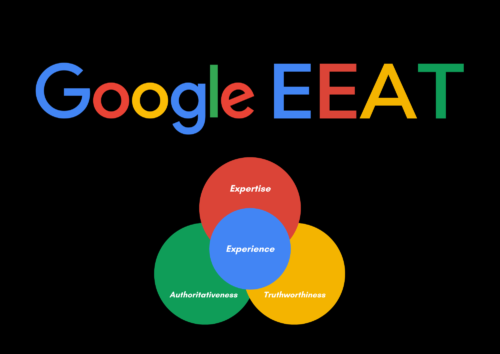Google EEAT: What Does This Update Mean For Your Website?
Chloe Humphreys March 22, 2023

Google’s guidelines and algorithm can be updated often, and this can have a knock-on effect on your SEO strategy. Late last year, Google updated its Quality Rate Guidelines, changing its well known content quality acronym from EAT to ‘Google EEAT.’ These guidelines are meant for Google’s human reviewers, and impacts how trustworthy your website is. This has had a big impact on how websites are now ranked on Search Engine Results Pages. But how is Google EEAT different from its predecessor? What does this update mean for your website?
What does EAT stand for in SEO?
Google E-A-T used to stand for Expertise, Authoritativeness, and Trustworthiness. Content raters would evaluate content based on these metrics, making sure that content writers were writing with all of these aspects in mind. However, in December of 2022, Google updated its guidelines to include an extra ‘E’ making it the new guidelines ‘Google EEAT.’
What is Google EEAT?
Google EEAT now stands for Experience, Expertise, Authoritativeness and Trustworthiness. When it comes to content quality, Google reviewers are now looking for demonstrated real-world experience with the topic at hand. Experience in the written subject affects your content, as your understanding of the subject reflects how you write about it. Demonstrating first-hand experience with the subject matter is now more important than ever when it comes to meeting the Google EEAT guidelines.
Google EEAT emphasises the importance of content quality. Content quality seems to be Google’s main priority right now. Low quality, AI generated content has started to besiege the internet. Google EEAT’s new guidelines are designed to help determine the quality of website content. It’s important to remember that Google EEAT won’t directly impact your rankings instantly, however, they give you a better idea of what Google prioritises when it comes to quality content.
This excerpt from Google EEAT’s new guidelines define what ‘Experience’ means:
“Consider the extent to which the content creator has the necessary first-hand or life experience for the topic. Many types of pages are trustworthy and achieve their purpose well when created by people with a wealth of personal experience.” – Google
Trust and experience are now more important than Expertise, Authoritativeness and Trustworthiness when it comes to SEO. However, if you’re following the old Google EAT, you are well on your way to meeting Google IT’s guidelines.
Why is experience important in SEO content?
Making sure your website’s content is trustworthy and has proof of real-life world experience is one of the best ways to ensure you are meeting the Google EEAT guidelines. You wouldn’t take advice from someone who has no experience in the subject – neither would internet users!
Adding experience to your website’s SEO content improves Google’s search results. Adding proof that you’re a qualified writer is one of the best ways you can meet the Google EEAT guidelines and improve the quality of your website. Using a qualified content team that writes for humans, not bots, is one of the best ways to improve your website’s trustworthiness according to the Google EEAT rules.
AI and Chat GPT

Chat GPT and its recent developments have created an online storm recently, and the Google EEAT update will affect AI-generated content. With Chat GPT’s language model, you can create emails, articles, and much more.
However, AI-generated content is often low quality. It usually has false statements and unverifiable information. AI cannot edit or be an expert on a subject. Because of this, AI generated content often does not pass Google EEAT guidelines. Furthermore, Chat GPT 4 does not have data after 2021, meaning it is unable to write current news.
Qualified content written by experts will always be better in terms of the Google EEAT guidelines.
What does the Google EEAT update mean for SEO?
The Google EEAT guidelines should be considered when you’re writing new content for your website, or updating already existing content. Google evaluates each piece of content individually to see if it meets the Google EEAT guidance.
It’s important that every user who uses your site can trust the knowledge and content being shared on there, and that it’s original, engaging, well-written, and substantiated by real-life experience. The Google EEAT update is designed to promote better content that takes this into consideration.
SEOs should be responsible for creating helpful, authentic, interesting content. To create successful content, we should be consulting with our clients or in-house teams about the topics we are writing about. Having comments from experts with first-hand experience in the topic will empower the websites we work on, allowing it to rank better and establish a reputation for high quality content. As long as SEOs write content that takes experience into account, it will follow the Google EEAT guidance.
Final Thoughts
The main goal of the Google EEAT update is to ensure website and content quality remains high. Following the Google EEAT guidelines will ensure that your users find your website a trustworthy and credible source of information.
To stay ahead of your competitors, follow the Google EEAT guidelines and keep updated with any other Google updates. This will allow you to update and create content that will actually help your website’s users and raise your website’s trustworthiness.
